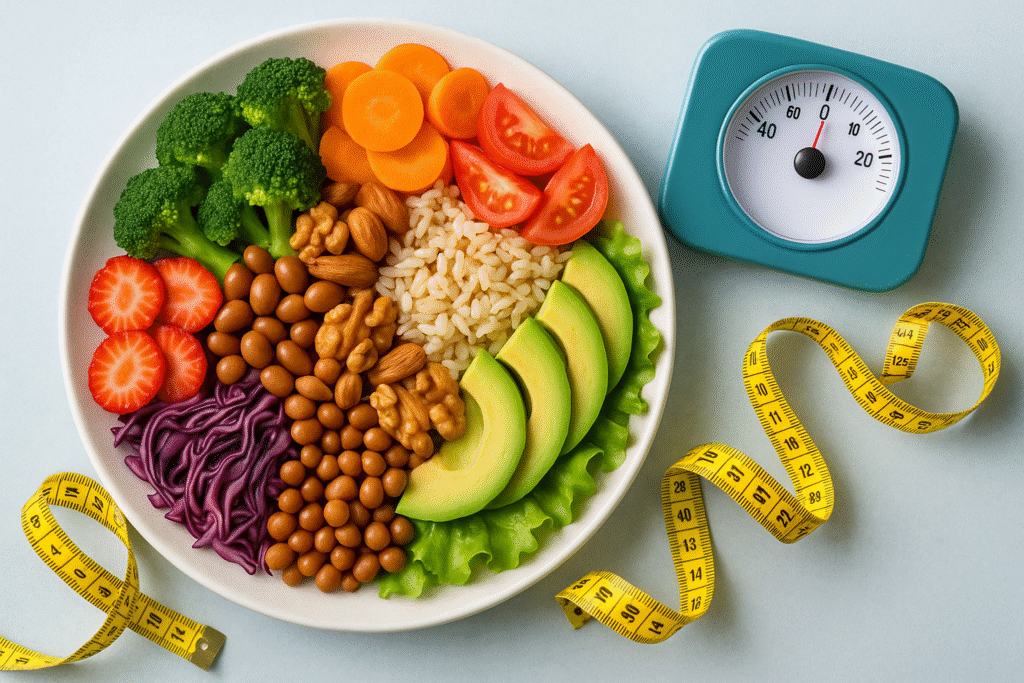In today’s health-conscious world, the vegan diet stands out not only for its ethical and environmental benefits but also as a powerful approach to weight management. By focusing on plant-based foods and eliminating animal products, the vegan lifestyle can naturally help reduce calorie intake, boost metabolism, and support sustainable weight loss. But how exactly does it work, and how can you make it work for you?
Ready to Accelerate Your Vegan Weight Loss Journey?
Discover how HepatoBurn can support healthy fat burning and liver function—two key factors for effective weight loss!
👉 Click here to learn more and claim your risk-free trial of HepatoBurn!
What Is a Vegan Diet?
A vegan diet is centered on plant-based foods—think fruits, vegetables, whole grains, legumes, nuts, seeds, and non-dairy alternatives like almond or oat milk. It completely excludes all animal-derived products, including meat, fish, dairy, eggs, honey, and gelatin. For many, veganism is more than just a diet; it’s a commitment to animal welfare and environmental sustainability.
Why Choose Veganism for Weight Loss?
Research shows that people following vegan diets often experience significant weight loss compared to those on other diets. This is largely due to higher fiber intake, lower calorie density, and reduced consumption of unhealthy fats. Vegan diets are also linked to lower risks of chronic diseases such as heart disease, type 2 diabetes, and certain cancers.
What Does “Healthy Weight” Mean?
A healthy weight isn’t just a number on the scale—it’s about overall well-being. Factors like age, gender, muscle mass, bone density, and body composition all play a role. Achieving and maintaining a healthy weight involves balanced eating, regular exercise, good sleep, and stress management, rather than extreme dieting or rapid fixes.
Is a Vegan Diet Effective for Weight Loss?
Yes, a vegan diet can be highly effective for weight loss, especially when you focus on whole, nutrient-dense foods and control your portions. Studies suggest that vegans often lose more weight than those following semi-vegetarian, pesco-vegetarian, or omnivorous diets. Plant-based diets can also increase your metabolism and help burn more calories at rest. However, it’s important to plan carefully to meet your nutritional needs and avoid deficiencies.
Nutrition: The Key to Vegan Weight Loss
Simply going vegan doesn’t guarantee weight loss. Success comes from eating fewer calories than you burn, choosing satisfying foods, and ensuring you get enough protein, fiber, vitamins, and minerals. A well-planned vegan diet keeps you full, nourished, and energized as you shed pounds.
How to Start a Vegan Diet for Weight Loss
Ready to get started? Here’s how to transition smoothly and effectively:
1. Prioritize Plant-Based Proteins
Protein is essential for satiety and muscle maintenance. Include beans, lentils, chickpeas, tofu, tempeh, edamame, nuts, and seeds in your meals. Consider fortified foods like quinoa and nutritional yeast, or vegan protein powders if needed.
2. Fill Up on Fiber
Fiber helps you feel full and supports digestion. Choose whole grains (brown rice, oats, quinoa), legumes, non-starchy vegetables (leafy greens, broccoli, peppers), and fiber-rich fruits (berries, apples, citrus). Check labels and aim for foods with at least 3-5 grams of fiber per serving.
3. Limit Processed Vegan Foods
Not all vegan products are healthy. Minimize highly processed foods like vegan junk food, frozen meals, and sugary snacks. Focus on whole, unprocessed foods for better weight loss results.
4. Read Food Labels Carefully
Look for hidden animal ingredients, unhealthy fats, and added sugars. Choose products labeled “vegan” and compare nutrition facts to select options with more fiber and less sugar and saturated fat.
5. Cut Down on Refined Sugar
Reduce or eliminate refined sugars found in sodas, candies, and packaged foods. Opt for natural sweetness from fruits, and use natural sweeteners like maple syrup or agave sparingly.
Struggling to See Results?
Boost your metabolism and support your liver naturally with HepatoBurn.
Try HepatoBurn today and see the difference!
Healthy Vegan Foods for Weight Loss
Here are some top picks for your vegan weight loss journey:
- Legumes: Beans, lentils, chickpeas, and peas—great for protein and fiber.
- Leafy Greens: Spinach, kale, Swiss chard—low in calories, high in nutrients.
- Whole Grains: Quinoa, brown rice, oats, millet—provide lasting energy.
- Berries: Blueberries, strawberries, raspberries—antioxidant-rich and low-calorie.
- Nuts & Seeds: Almonds, chia seeds, flaxseeds—healthy fats and protein (in moderation).
- Tofu & Tempeh: Versatile plant proteins for savory dishes.
- Avocado: Healthy fats to keep you satisfied.
- Non-Dairy Yogurt: Unsweetened almond, soy, or coconut yogurt for a creamy snack.
- Herbs & Spices: Turmeric, cinnamon, cayenne—add flavor and may boost metabolism.
- Nutritional Yeast: Adds cheesy flavor and B vitamins.
Meal Planning for Vegan Weight Loss
Meal planning is crucial for success. Here’s how to do it:
- Set Clear Goals: Know how much weight you want to lose and by when.
- Calculate Calorie Needs: Use online tools or consult a dietitian.
- Choose Nutrient-Dense Foods: Fill your plate with fruits, veggies, whole grains, and plant-based proteins.
- Practice Portion Control: Use measuring cups or a food scale.
- Balance Your Meals: Include protein, complex carbs, healthy fats, and plenty of vegetables.
- Cook at Home: Control ingredients and portion sizes.
- Prep Ahead: Wash, chop, and portion foods for easy access.
- Stay Hydrated: Drink water throughout the day.
- Track Your Progress: Use a food journal or app to stay on track.
🔥 Want Faster Weight Loss on a Vegan Diet?
Tap here to discover HepatoBurn—the science-backed supplement for healthy fat loss!
Order Now
Final Thoughts
A vegan diet can be a powerful, sustainable way to lose weight and improve your overall health—if done thoughtfully. Focus on whole, nutrient-rich foods, keep your meals balanced, and don’t hesitate to seek guidance from a nutritionist or dietitian to ensure you’re meeting all your nutritional needs. With patience and consistency, you can achieve your weight loss goals while enjoying the many benefits of a plant-based lifestyle.
